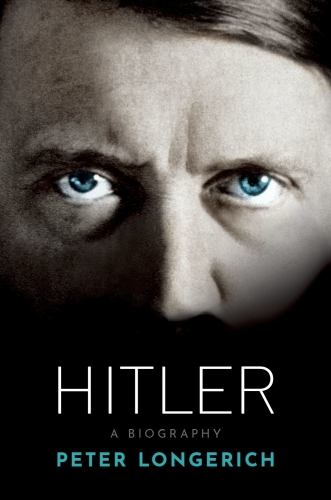
Hitler
A Biography
کتاب های مرتبط
- اطلاعات
- نقد و بررسی
- دیدگاه کاربران
نقد و بررسی

September 1, 2019
With this latest work, Longerich (modern German history, Royal Holloway Univ. of London; Holocaust: The Nazi Murder and Persecution of the Jews) suggests that while Adolf Hitler's specific personality traits, such as a stunted emotional development that prevented him from feeling empathy, were present before World War I, his virulent anti-Semitism and grandiose sense of destiny resulted from the circumstances of post-1918 Germany. Previous studies of the Nazi state have focused on administrative chaos and an increasingly radicalized base that wished to satisfy the leader. While Longerich agrees that Hitler was an inept administrator, he convincingly argues that the administrative upheaval was a function, not a glitch, of the system, enabling Hitler to act as arbiter of policy conflicts and to insert himself forcefully into policy decisions. Thus, in the final analysis, Nazi Germany and all its policies were Hitler's alone. VERDICT Although the work is occasionally dense owing to the minutiae of German politics, such details are integral to Longerich's assertion of Hitler's centrality to all decisions, such as the Holocaust. While some may question the need for another Hitler biography, readers and scholars of 20th-century history will welcome this one.--Frederic Krome, Univ. of Cincinnati Clermont Coll.
Copyright 2019 Library Journal, LLC Used with permission.

Starred review from August 1, 2019
An expert on Nazi Germany delivers a massive new biography of arguably the most monstrous leader in history. Longerich (Modern German History/Royal Holloway Univ. of London; Goebbels: A Biography, 2015, etc.) addresses the many biographies that have come before, notably by Ian Kershaw and Joachim Fest, which tend to characterize Hitler as a loner and an outsider, a "nonperson." In contrast, Longerich examines Hitler's "autonomous role as an active politician" in shaping the policies of his party. "I argue...that critical turning points in Hitler's policies cannot be seen as the result of external constraints and structural determinants but were the product of decisions he forced through in the face of resistance and significant retarding factors," writes the author. After Hitler's first three nondescript decades, the post-World War I depression gave way to fury and rage at the German defeat, and he found expression as a propagandist for the extreme right-wing German Workers' Party. Emerging a "magnificent failure" from his botched putsch, trial, and imprisonment, he set about creating a public image and political program with Mein Kampf, articulating especially his anti-Semitism and the conquest of "living space" in Eastern Europe. Although he was appointed chancellor in January 1933, his party, writes Longerich, "still had no more than one-third of the electorate behind it," and it took "great political skill" over the next 18 months to transform the government into a Hitler dictatorship. The author deftly shows how Hitler actively "steered the course of events"--e.g., neutralizing the left, removing basic rights, eliminating trade unions, asserting total Nazi control of all clubs and associations, and "sorting out" the role of the two churches. As the momentum of terror grew, so did the inner conflicts and inconsistencies. Yet these did not undermine Hitler's rule; on the contrary, the often cited "chaos of offices," the author notes, "strengthened his personal position" and "allowed him...to enforce his political will directly as an autocratic dictator." Throughout, the author wears his impeccable scholarship lightly, creating a fresh picture of one of history's most written-about subjects. A Hitler biography unlikely to be surpassed for quite some time.
COPYRIGHT(2019) Kirkus Reviews, ALL RIGHTS RESERVED.

Starred review from September 1, 2019
How does a floundering artist peddling watercolors in Munich's bars transform himself into the f�hrer, absolute dictator over much of Europe? In a biography combining illuminating insights with exhaustive scholarship, Longerich retraces the fateful path of this failed watercolorist. Though he acknowledges that historical circumstances gave the maturing Hitler his opening, Longerich strongly resists the perspective of Ian Kershaw, who asserts in his two-volume life of Hitler (1999, 2000) that the social dynamics of the faltering Weimar Republic set the political trajectory of this painter-turned-demagogue. Longerich argues convincingly that Hitler repeatedly resists contemporary social and political pressures as he captures first a party, then an entire nation as extensions of his own iron will. Readers watch the nascent dictator outmaneuver and out-propagandize his rivals; terrorize and murder foes; and mesmerize and finally degrade a once-proud people to fulfill his megalomanic fantasies. In detailing how Hitler pursues his most horrific fantasy?his Final Solution?Longerich shows that Hitler again acts with individual initiative, ordering genocidal measures motivated by a personal animus far more intense than Germany's traditional anti-Semitism. Longerich indeed reveals how doggedly Hitler presses for the extermination of Jews even as the Allies' hammer blows are driving him into the bunker, where he shoots himself. A chilling but masterful portrait.(Reprinted with permission of Booklist, copyright 2019, American Library Association.)

























دیدگاه کاربران